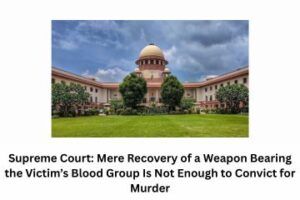ORDER XXXVII Rule 3 CPC- Grant Of Leave To Defend Is The Ordinary Rule; Denial An Exception
Case Name: B.L. Kashyap And Sons Ltd. Vs JMS Steels And Power Corporation
Coram: Justices Vineet Saran and Dinesh Maheshwari
Case No.: SLP(C) 19413 OF 2018
Court Observation: It is at once clear that even though in the case of IDBI Trusteeship, this Court has observed that the principles stated in paragraph 8 of Mechelec Engineers’ case shall stand superseded in the wake of amendment of Rule 3 of Order XXXVII but, on the core theme, the principles remain the same that grant of leave to defend (with or without conditions) is the ordinary rule; and denial of leave to defend is an exception. Putting it in other words, generally, the prayer for leave to defend is to be denied in such cases where the defendant has practically no defence and is unable to give out even a semblance of triable issues before the Court.
As noticed, if the defendant satisfies the Court that he has substantial defence, i.e., a defence which is likely to succeed, he is 18 entitled to unconditional leave to defend. In the second eventuality, where the defendant raises triable issues indicating a fair or bonafide or reasonable defence, albeit not a positively good defence, he would be ordinarily entitled to unconditional leave to defend. In the third eventuality, where the defendant raises triable issues, but it remains doubtful if the defendant is raising the same in good faith or about genuineness of the issues, the Trial Court is expected to balance the requirements of expeditious disposal of commercial causes on one hand and of not shutting out triable issues by unduly severe orders on the other. Therefore, the Trial Court may impose conditions both as to time or mode of trial as well as payment into the Court or furnishing security. In the fourth eventuality, where the proposed defence appear to be plausible but improbable, heightened conditions may be imposed as to the time or mode of trial as also of payment into the Court or furnishing security or both, which may extend to the entire principal sum together with just and requisite interest.
Thus, it could be seen that in the case of substantial defence, the defendant is entitled to unconditional leave; and even in the case of a triable issue on a fair and reasonable defence, the defendant is ordinarily entitled to unconditional leave to defend. In case of doubts about the intent of the defendant or genuineness of the triable issues as also the probability of defence, the leave could yet be granted but while imposing conditions as to the time or mode of trial or payment or furnishing security. Thus, even in such cases of doubts or reservations, denial of leave to defend is not the rule; but appropriate conditions may be imposed while granting the leave. It is only in the case where the defendant is found to be having no substantial defence and/or raising no genuine triable issues coupled with the Court’s view that the defence is frivolous or vexatious that the leave to defend is to be refused and the plaintiff is entitled to judgment forthwith. Of course, in the case where any part of the amount claimed by the plaintiff is admitted by the defendant, leave to defend is not to be granted unless the amount so admitted is deposited by the defendant in the Court.
Therefore, while dealing with an application seeking leave to defend, it would not be a correct approach to proceed as if denying the leave is the rule or that the leave to defend is to be granted only in exceptional cases or only in cases where the defence would appear to be a meritorious one. Even in the case of raising of triable issues, with the defendant indicating his having a fair or reasonable defence, he is ordinarily entitled to unconditional leave to defend unless there be any strong reason to deny the leave. It gets perforce reiterated that even if there remains a reasonable doubt about the probability of defence, sterner or higher conditions as stated above could be imposed while granting leave but, denying the leave would be ordinarily countenanced only in such cases where the defendant fails to show any genuine triable issue and the Court finds the defence to be frivolous or vexatious.
Previous Posts
Section 304B IPC- Demand Of Money For Construction Of A House Is A ‘Dowry Demand’: Supreme Court
Deficiency in Service Under Consumer Protection Act: Supreme Court
Cryptic & Casual Bail Orders Without Relevant Reasons Liable To Be Set Aside: Supreme Court
Suit Simpliciter For Injunction Without Claiming Declaration Of Title Not Maintainable If Plaintiff’s Title Is Disputed: Supreme Court Download Judgement
Keywords
ORDER XXXVII Rule 3 CPC, Leave To Defend,




